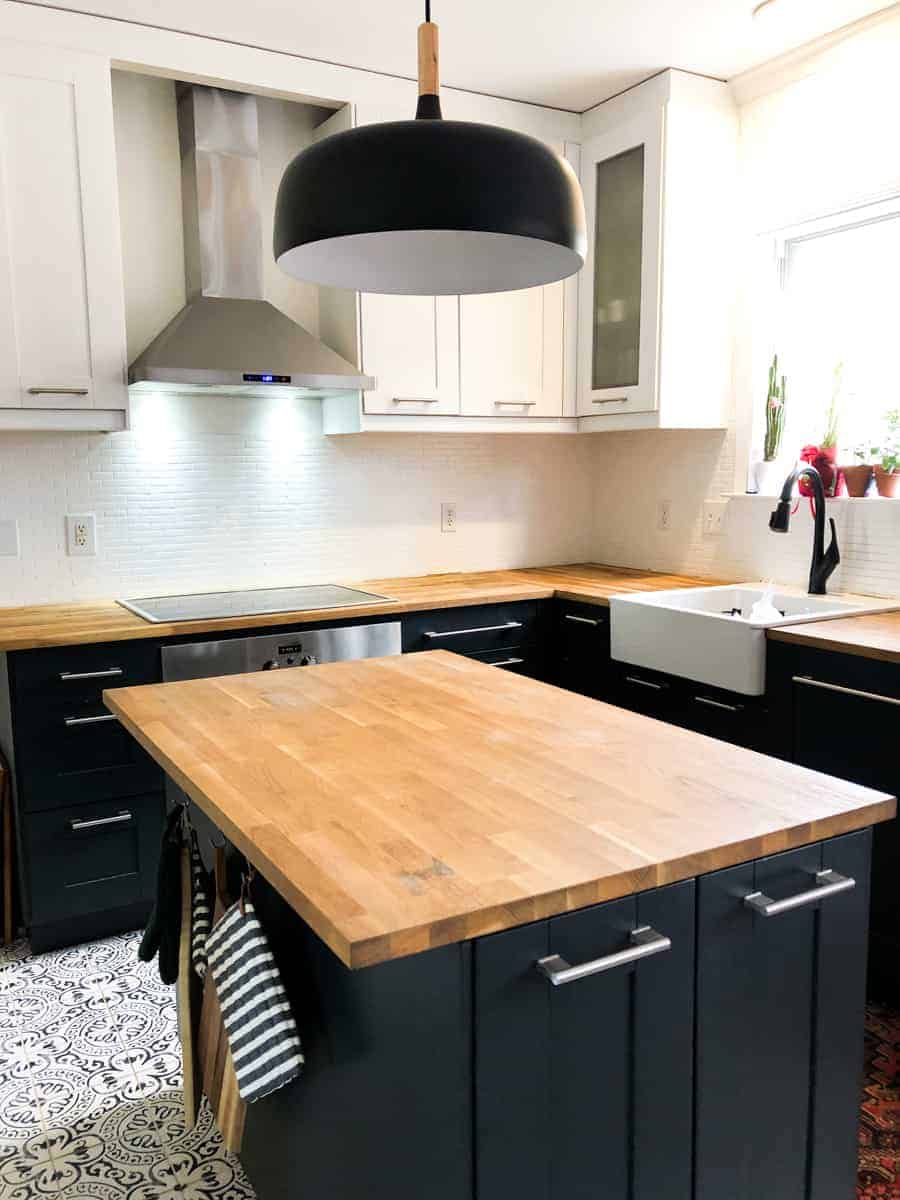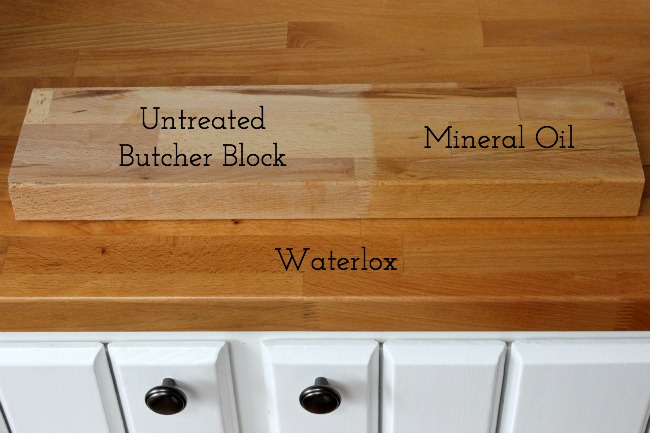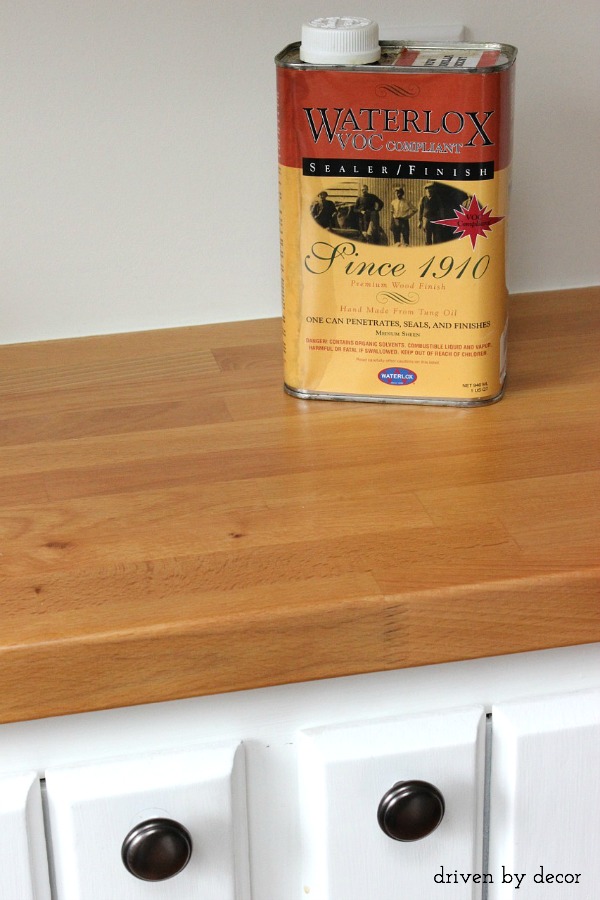Butcher block countertops offer a warm, natural aesthetic and durability that make them a popular choice for kitchens. To enhance their longevity and protect the wood surface, many homeowners opt to apply a polyurethane finish. In today’s post, we will talk about the benefits of using polyurethane on butcher block countertops, discuss the application process, explore maintenance tips, and address common misconceptions.

Benefits of Using Polyurethane
Polyurethane is a popular choice for sealing butcher block countertops due to its numerous benefits:
Durability: Polyurethane forms a durable, protective barrier over the wood surface, guarding against scratches, stains, and moisture damage. This makes it an ideal choice for high-traffic areas like kitchens where countertops are subjected to daily use.
Water Resistance: Polyurethane creates a water-resistant seal that helps prevent moisture from penetrating the wood and causing warping, swelling, or rot. This is particularly important in areas around sinks where water exposure is frequent.
Easy Maintenance: Butcher block countertops sealed with polyurethane are easy to clean and maintain. Simply wipe the surface with a damp cloth and mild soap to remove spills and debris. Unlike unsealed wood, polyurethane-sealed countertops resist staining and require minimal upkeep.
Enhanced Aesthetic: Polyurethane adds a glossy or satin finish to butcher block countertops, enhancing the natural beauty of the wood grain and providing a smooth, polished surface. This can elevate the overall look of your kitchen and complement various design styles.

Application Process
Applying polyurethane to butcher block countertops requires careful preparation and attention to detail:
Surface Preparation: Begin by sanding the countertop surface with progressively finer grit sandpaper to remove any imperfections, scratches, or stains. Wipe away dust and debris with a tack cloth or damp rag.
Application Method: Polyurethane can be applied using a brush, roller, or sprayer. Start by applying a thin, even coat of polyurethane to the countertop surface, working in the direction of the wood grain. Allow the first coat to dry completely according to the manufacturer’s instructions.
Sanding Between Coats: After the first coat has dried, lightly sand the surface with fine-grained sandpaper to smooth out any raised grain or imperfections. Wipe away dust and apply additional coats of polyurethane as needed, sanding between each coat for optimal adhesion and smoothness.
Curing Time: Allow the final coat of polyurethane to dry and cure thoroughly according to the manufacturer’s recommendations before using the countertop. This ensures that the finish fully hardens and provides maximum protection to the wood surface.

Maintenance Tips
To maintain the beauty and longevity of butcher block countertops sealed with polyurethane, follow these maintenance tips:
Regular Cleaning: Clean the countertop surface regularly with a mild soap and water solution to remove spills, stains, and debris. Avoid using harsh chemicals or abrasive cleaners that can damage the polyurethane finish.
Avoiding Heat and Moisture: Use trivets or hot pads under hot cookware and avoid placing wet items directly on the countertop surface to prevent damage to the polyurethane seal.
Reapplication: Periodically inspect the countertop surface for signs of wear or damage to the polyurethane finish. If necessary, sand the surface lightly and apply additional coats of polyurethane to maintain protection and appearance.
Avoiding Cutting Directly on the Surface: While polyurethane provides a protective barrier, it’s best to avoid cutting directly on the countertop surface to prevent scratching or gouging. Use cutting boards or mats to protect the wood.

Common Mistakes to Avoid
When applying polyurethane to butcher block countertops, avoid these common mistakes:
Skipping Surface Preparation: Failing to properly sand and prepare the countertop surface before applying polyurethane can result in uneven finish and poor adhesion.
Applying Thick Coats: Applying thick coats of polyurethane can lead to drips, runs, or uneven coverage. It’s essential to apply thin, even coats and allow sufficient drying time between coats.
Neglecting to Sand Between Coats: Sanding between coats of polyurethane is crucial for achieving a smooth, professional finish. Skipping this step can result in rough or bumpy surfaces.
Not Allowing Sufficient Curing Time: Rushing the curing process can compromise the durability and effectiveness of the polyurethane finish. It’s important to allow each coat to dry and cure thoroughly before applying additional coats or using the countertop.

How many coats of polyurethane should I apply to butcher block countertops?
The number of coats of polyurethane required for butcher block countertops depends on personal preference and the level of protection desired. However, it’s generally recommended to apply at least two to three thin coats of polyurethane for optimal durability and coverage. Be sure to sand between coats to achieve a smooth finish.
Can I use water-based polyurethane on butcher block countertops?
Yes, you can use water-based polyurethane on butcher block countertops. Water-based polyurethane offers similar durability and protection as oil-based polyurethane but has a lower odor and dries faster. It’s essential to choose a high-quality water-based polyurethane specifically designed for use on wood surfaces and follow the manufacturer’s instructions for application and drying times.
How long does polyurethane take to cure on butcher block countertops?
The curing time for polyurethane on butcher block countertops varies depending on factors such as temperature, humidity, and the number of coats applied. Generally, polyurethane takes about 24 to 48 hours to dry to the touch and several days to fully cure and harden. It’s crucial to allow sufficient curing time before using the countertop to ensure the polyurethane finish is fully hardened and provides maximum protection.
Can I apply polyurethane over an existing finish on butcher block countertops?
In most cases, it’s not recommended to apply polyurethane over an existing finish on butcher block countertops. Polyurethane requires a clean, bare wood surface to adhere properly and provide effective protection. If the existing finish is in good condition, you may be able to lightly sand it to create a suitable surface for polyurethane application. However, if the existing finish is damaged or compromised, it’s best to remove it entirely before applying polyurethane.
How often do I need to reapply polyurethane on butcher block countertops?
The frequency of reapplication of polyurethane on butcher block countertops depends on factors such as usage, cleaning habits, and the condition of the countertop surface. In general, it’s recommended to inspect the countertop surface periodically for signs of wear or damage to the polyurethane finish. If you notice areas where the finish has worn away or become damaged, you can lightly sand the surface and apply additional coats of polyurethane as needed to maintain protection and appearance.

Sealing Butcher Block Countertops: Waterlox vs. Mineral Oil

How We Refinished our Butcher block Countertop – Chris Loves Julia

My Take on Butcher Block Countertops”Woodnu0027t” You Like to Know

Remodelaholic Easy Butcher Block Countertop Tutorial Butcher

Related articles:
- Teak Butcher Block Countertops
- Order Butcher Block Countertops
- What To Seal Butcher Block Countertops With
- Types Of Butcher Block Countertops
- How To Make Your Own Butcher Block Countertop
- Polyurethane On Butcher Block Countertops
- How Much Are Butcher Block Countertops
- White Cabinets Butcher Block Countertops
- What Is The Best Wood For Butcher Block Countertops?
- Lumber Liquidators Butcher Block Countertop Review